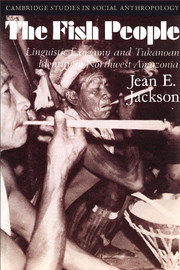Book contents
- Frontmatter
- Contents
- List of figures, maps, and tables
- Preface
- Acknowledgments
- Note on orthography
- 1 Purpose and organization of the book
- 2 Introduction to the Central Northwest Amazon
- 3 The longhouse
- 4 Economic and political life
- 5 Vaupés social structure
- 6 Kinship
- 7 Marriage
- 8 Tukanoans and Makú
- 9 The role of language and speech in Tukanoan identity
- 10 Male and female identity
- 11 Tukanoans' place in the cosmos
- 12 Tukanoans and the outside world
- 13 Conclusions: themes in Tukanoan social identity
- Notes
- Glossary
- References
- Index
- CAMBRIDGE STUDIES IN SOCIAL ANTHROPOLOGY
10 - Male and female identity
Published online by Cambridge University Press: 05 June 2012
- Frontmatter
- Contents
- List of figures, maps, and tables
- Preface
- Acknowledgments
- Note on orthography
- 1 Purpose and organization of the book
- 2 Introduction to the Central Northwest Amazon
- 3 The longhouse
- 4 Economic and political life
- 5 Vaupés social structure
- 6 Kinship
- 7 Marriage
- 8 Tukanoans and Makú
- 9 The role of language and speech in Tukanoan identity
- 10 Male and female identity
- 11 Tukanoans' place in the cosmos
- 12 Tukanoans and the outside world
- 13 Conclusions: themes in Tukanoan social identity
- Notes
- Glossary
- References
- Index
- CAMBRIDGE STUDIES IN SOCIAL ANTHROPOLOGY
Summary
It is difficult to discuss Tukanoan sex roles and identity comprehensively in a single chapter. First, an entire book would be required to do justice to the necessary ethnographic material, particularly with respect to the extraordinarily rich ritual and mythological expressions of sex differences. Fortunately, other investigators have discussed some of the symbolism of Tukanoan sex roles. (Sex roles refers to all of the ways in which Tukanoan males and females behave differently, see themselves as different, and symbolically express these differences.)
Second, the nature of the subject matter itself requires more extensive treatment than is possible within one chapter. The fledgling state of the field of sex roles as a topic in its own right creates certain difficulties, which have been discussed in many articles and books. Both our own society and lowland South American societies see men and women as fundamentally different (see Jackson, n.d.-a.). Yet what does this mean? Seemingly insoluble problems arise in connection with objectivity and agreement over basic assumptions and correct research design and goals. How do we evaluate the differences existing between the sexes in all Amazonian societies in terms of crucial questions concerning status, power, solidarity, egalitarianism versus hierarchy, among others? What do these differences mean, comparatively speaking, in a society so unlike our own, a society where age and sex are the main criteria of social differentiation? Yet we can hardly accept uncritically the “inside” view – the native interpretation – of sex differences, even supposing there were a single such view.
- Type
- Chapter
- Information
- The Fish PeopleLinguistic Exogamy and Tukanoan Identity in Northwest Amazonia, pp. 179 - 194Publisher: Cambridge University PressPrint publication year: 1983



